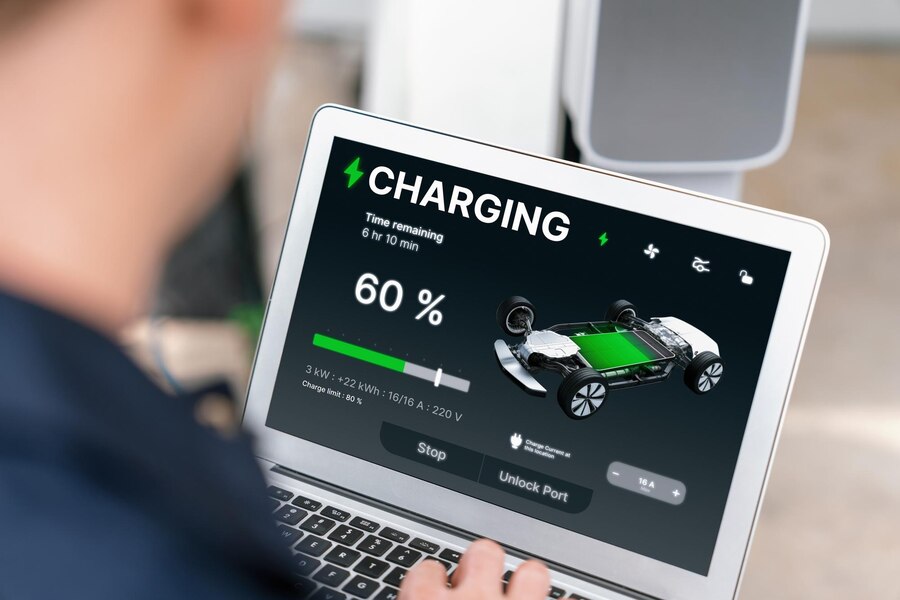Understanding Electric Car Battery Capacity: A Comprehensive Guide

If you’re considering making the switch to an electric vehicle (EV), understanding electric car battery capacity is one of the most critical aspects to consider. Battery capacity directly affects how far you can drive on a single charge, the overall efficiency of your vehicle, and how much you’ll spend on charging over time. In this guide, we’ll explore all the essential details about electric car battery capacity, how it impacts your driving experience, its maintenance costs, and the future of battery technology in electric vehicles.
With electric cars becoming increasingly popular due to their environmental and financial benefits, knowing how much battery in electric cars you need for your specific driving habits is crucial for making an informed decision. This article will break it down for you, making the complex world of electric vehicle batteries easier to understand.
What is Electric Car Battery Capacity?
At its core, electric car battery capacity refers to the amount of energy that a battery can store, which is measured in kilowatt-hours (kWh). This unit reflects how much energy the battery can hold, just like the size of a fuel tank in a traditional car determines how much fuel it can carry. The bigger the battery’s capacity, the farther the car can travel on a single charge.
For example, an electric vehicle with a battery capacity of 60 kWh can store more energy than one with a 40 kWh battery, allowing for a longer range before needing a recharge. The battery capacity of electric cars typically ranges between 30 kWh for smaller city cars and over 100 kWh for high-end luxury models. However, the ideal EV battery size depends on how you plan to use your car—whether for short city commutes or long-distance trips.
A typical EV with a battery capacity of around 60-70 kWh can travel between 220-270 miles, while a 100 kWh battery can push ranges well above 300 miles. But larger capacities usually come with higher price tags. When selecting a car, it’s essential to consider both the size of the battery and how you intend to use the vehicle.
| EV Battery Size | Estimated Range |
| 30-40 kWh | 120-150 miles |
| 60-70 kWh | 220-270 miles |
| 100 kWh or more | 300+ miles |
Factors That Affect Battery Capacity and Lifespan
Electric car battery capacity is not a static figure—it can degrade over time, influenced by several factors. Understanding what impacts the battery capacity of electric cars can help you make smarter decisions about maintenance and usage. Here are the key factors:
- Temperature: Extreme temperatures, especially heat, can negatively affect electric vehicle battery capacity. In warmer climates, batteries tend to degrade faster due to overheating, while cold weather can temporarily reduce range. Storing your car in moderate temperatures helps prolong battery life.
- Charging Cycles: Every time you charge and discharge the battery, it slightly wears down its maximum capacity. This natural degradation process occurs in all lithium-ion batteries, including those used in electric cars. However, most modern EVs are equipped with advanced battery management systems (BMS) that optimize charging and discharging to preserve longevity.
- Driving Habits: Your driving style can also influence how quickly your battery degrades. Frequent rapid acceleration and high-speed driving can cause the battery to drain faster, while smoother driving can help maintain EV battery size and range over time.
- Charging Speed: Regular use of fast charging (e.g., public rapid chargers) can accelerate wear on the battery. While convenient, it’s recommended to use slower home charging methods for daily use to preserve electric car battery capacity.
Pro Tips for Extending Battery Lifespan:
- Charge your car overnight using a home charger to maintain a steady and gentle charging process.
- Avoid depleting the battery to 0% regularly; aim to keep it between 20-80% for optimal performance.
- Minimize the use of fast charging stations unless absolutely necessary, as they can degrade the battery faster.
How Long Do Electric Car Batteries Last?
The longevity of an electric vehicle battery capacity is often a key concern for prospective buyers. The good news is that most electric car batteries are designed to last between 10 to 20 years, depending on usage and environmental factors. In terms of mileage, many EV batteries can comfortably last for 200,000 miles or more.
Most EV manufacturers back their batteries with warranties, typically covering 8 years or 100,000 miles, with some states (like California) extending that to 10 years or 150,000 miles. As a result, you can drive with confidence knowing your electric car battery capacity will serve you for many years before requiring a replacement.
On average, EV batteries degrade by around 2.3% per year, meaning that after five years, your battery might still retain about 88% of its original capacity. Even after significant use, many EV batteries still provide ample range for daily driving needs.
Future of Electric Car Batteries: Solid-State Technology
As electric vehicles continue to grow in popularity, advancements in battery technology are driving the industry forward. Solid-state batteries are considered the next leap in improving electric car battery capacity. These batteries use a solid electrolyte instead of the liquid found in current lithium-ion batteries, offering several advantages:
- Higher energy density, meaning they can store more energy in a smaller package, improving EV battery size without sacrificing range.
- Faster charging times, potentially cutting down recharging time significantly.
- Increased safety, with a lower risk of overheating or fire due to the solid nature of the electrolyte.
While solid-state batteries are still in development, they hold the potential to revolutionize electric vehicles by providing better range, safety, and charging speed—all of which could enhance the future of electric car battery capacity.
How Much Does It Cost to Replace an Electric Car Battery?
Replacing an electric car battery can be a costly process. Depending on the model and battery size, replacement costs can range from $5,000 to $20,000. The price is largely driven by the cost of raw materials like cobalt, nickel, and lithium, as well as the complex manufacturing process involved in building high-capacity batteries.
However, with electric vehicle battery capacity improving and the cost of EVs steadily decreasing, the overall cost of ownership continues to drop. It’s also worth noting that many EVs come with long warranties that cover the battery for up to 8-10 years, meaning that most drivers won’t need to worry about battery replacement for many years.
How to Extend Your Electric Car Battery’s Lifespan
Extending the lifespan of your electric car battery capacity is simpler than it may seem. By following a few straightforward practices, you can help ensure your EV battery lasts as long as possible:
- Follow manufacturer guidelines: Every EV manufacturer has specific instructions on how to best care for the battery, from optimal charging practices to software updates. Adhering to these guidelines is crucial for maintaining EV battery size and longevity.
- Store your car in moderate temperatures: Protect your vehicle from extreme heat or cold by parking in a garage or shaded area, especially if you live in a warmer climate.
- Limit fast charging: While fast chargers are convenient, they can cause the battery to degrade faster if used frequently. Rely on slower home charging for daily use to help preserve electric vehicle battery capacity.
- Update your software: Keeping your vehicle’s software up-to-date ensures that you benefit from the latest improvements in battery management and efficiency.
Conclusion
Choosing the right electric car battery capacity depends on your specific driving needs, budget, and how far you typically travel. While larger battery capacities provide more range, they are also more expensive. However, with proper care and maintenance, you can ensure that your EV battery size will serve you well for years to come, providing both cost savings and environmental benefits.
Call to Action: Explore Battery Solutions with KwikFix Auto
For the best battery options for your electric vehicle, look no further than KwikFix Auto. We offer top-quality batteries from leading brands such as Amaron, Exide, and Tata. Whether you’re in need of a battery replacement or expert advice, our team is here to help. Explore our battery solutions or call us at +91 9950 345 345 today for the best prices and fast installations. Keep your EV running at its best with KwikFix Auto!
Frequently Asked Questions
Q1. How much battery capacity does an average electric car have?
A1. Most electric cars have a battery capacity between 40 kWh and 100 kWh, with larger vehicles offering even more.
Q2. Does driving style affect battery life?
A2. Yes, aggressive driving and frequent rapid charging can reduce battery efficiency over time.
Q3. How often should I charge my electric car?
A3. It’s best to charge regularly, but avoid depleting the battery fully. Charging overnight at home is the most convenient and cost-effective option.
Q4. What is the difference between kWh and EV range?
A4. kWh measures the energy storage capacity of the battery, while range refers to how far the car can travel on a full charge.
Q5. How long does it take to charge an electric car?
A5. Charging times vary depending on the battery size and charger type. Fast chargers can replenish up to 80% of the battery in about 30-60 minutes.
Q6. Can electric car batteries be recycled?
A6. Yes, most EV batteries can be recycled or repurposed for secondary energy use, such as home energy storage.
Q7. What happens to EV batteries at the end of their life?
A7. After they are no longer suitable for vehicle use, many batteries still retain significant capacity and can be repurposed for other applications.
Q8. Are larger batteries always better?
A8. Not always. A larger electric car battery capacity offers more range, but it also comes at a higher cost. The ideal battery size depends on your driving habits and budget.
Related Articles
AC Not Working in Car | Car AC Coil Replacement Cost | How to Use Car AC | Car AC Problems | Car AC Cleaner Foam | Car AC Evaporator Cleaner | AC Switch for Car | Cost of Replacement Electric Car Batteries | Is Apollo Tyre Good | Apollo Tyres vs MRF Tyres





